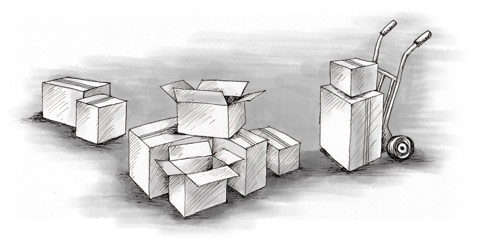Many people choose to relocate to Australia for the intoxicating coastlines. It’s true that this country has numerous hot spots for swimming, snorkeling and surfboarding, but if you’re on a limited budget, remember that the closer a home is to the coast, the pricier it’s going to be.
There’s no denying that if you’re moving to be with friends or family who have also made the big jump, then you will be in a better position than someone who isn’t. But this doesn’t mean that those without that familial safety net will come trudging back home six months later, deflated. If you like sports, join a local club or a gym. If you have children, get them involved in community activities. Unless you’re moving to the far reaches of the Australian outback, you’ll be moving to a neighborhood that will always provide ways of making local connections.
Smooth sailing
Now how do you make this important transition as smooth as possible (knowing you will probably have to ship some of your things)? Presumably, there will be friends and family to help you during this time, so just the simple act of letting everyone know your whereabouts will make your journey easier.
Draw up a little spreadsheet with your schedule, your address, and your contacts’ phone numbers. Make sure your contacts, both at home and in Australia, have a copy. Oh, and make sure they read it otherwise that tip won’t work.
Australia’s customs are among the strictest in the world - just ask the excess baggage companies. You’re probably aware that most animals and plants can’t be taken into the country , but there are other items that could lead to a dreaded ‘inspection’. For instance, if you’re taking shoes or boots with you, wash them thoroughly before packing; any mud on your footwear could lead to their confiscation (we told you they were strict.)
If you consider having packed a fair amount of household items and furniture for the move, it may be in your best interests to ditch some of it - sorry, we meant ‘eBay’ some of it. Of course, take items of sentimental value, but if you can replace an item with something similar in Australia take that option. It will cost less and you won’t have to worry about transportation.
No matter how meticulously you make your schedule spreadsheet, you can almost guarantee that you’ll end up straying from it a little. Take this into account when shipping your stuff - Seven Seas offer up to 4 weeks storage before and after your move when you ship with their MoveCube. This’ll give you plenty of leeway when it comes to tying up all the loose ends at home and getting things sorted in Australia.
What to do on arrival
Once you’ve made it to the other side - and you’ve looked up at the clear blue sky for a few minutes, reminding yourself why you did all of this in the first place- it’s time to go through customs for all the necessary inspections and checks.
Make sure you have your passport and your Incoming Passenger Card (IPC) to hand over to immigration officers. It might be a good idea to stop by the currency exchange desk to convert your money to Australian dollars while you’re at the airport. We suggest $20, $10 and $5 notes and $2 and $1 coins.
Don’t forget the usefulness of the airport’s information desk for other things too, such as short-term accommodation and transport options. Speaking of which, if you’re thinking about renting a car from the airport, you’ll need your driver’s licence handy. It will take you longer to get out and about if you fail to produce the right travel documents and visas. We don’t want to sound like a customs official, but it’s true.
Buying a house?
Luckily, the property market in Australia has gotten through the global economic crisis relatively unscathed, so on top of the lovely weather, the health care, the education system and the quality of life, Australia also has a strong currency. Lucky blighters.
However, be prepared for the possibility that moving overseas in the pursuit of your dream home could be a bumpy ride. Just like in the UK, if you can buy a property that ‘needs a bit of work’ and knocks the seller down on the asking price, you could find yourself with a desirable investment – particularly if you’re lucky enough to find the property in an up-and-coming area or one going through extensive renovations. You’ll know which areas are undergoing renovation – there will be a lot of bright colors, straight edges and hipsters in red jeans wearing non-prescription glasses. Actually, maybe that’s just like in the UK.
Of course, there’s a chance you might not be so lucky. New houses are being built all the time, but there aren’t enough of them to cope with the stream of newcomers, pushing the prices up. A house which would have been within your financial reach a few years ago, may now be as far off as the Disneyland Castle.
An obvious yet worth mentioning tip is that you should stay close to - but not necessarily on - the coast when viewing property. Should you wish to move at a later date, you will never find a shortage of prospective buyers, whatever the price of the home. The best way to ensure a smooth transition is to talk to your chosen bank in your adopted home. After all, if you can’t trust a bank, who can you trust?
Wait. Scrap that.




